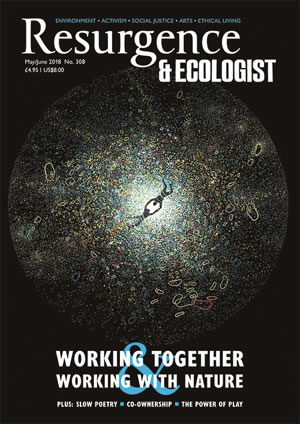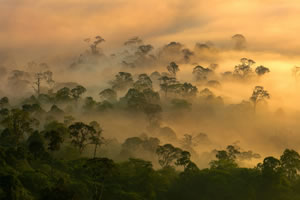Tony Juniper is a man with a mission “to do for the natural environment what is finally happening with climate change – to attack the global wave of extinctions with the same focus and energy that climate campaigners took to Paris in 2015!”
Unlike most of us however, he is in a place where he might actually be able to bring it off. As the new campaigns director at WWF UK, he is determined to remotivate the organisation and make it a powerful fighting force to save our imperilled natural world. And the first thing is to transform the way we see Nature.
This is clear from the first chapter of his new book, Rainforest: Dispatches from Earth’s Most Vital Frontlines. Rather than reiterating the usual compendium of precious rainforest biodiversity, he kicks off with the seemingly obscure research of scientist Peter Bunyard (as it happens, a former editor of the Ecologist) and his ingeniously low-tech experiments in a home-made ‘cloud chamber’ in his Cornwall garden.
Bunyard’s work has conclusively proved key elements of the ‘biotic’ pump theory originally advanced by Anastassia Makarieva and Victor Gorshkov: that forests – and especially rainforests – do not merely grow in places that experience high rainfall. They themselves cause the rainfall and spread their life-giving rain and humidity through the atmosphere on a transcontinental scale. Hence the vast Amazon rainforest is responsible for the moisture carried in 6km-high ‘sky rivers’ all the way from the Atlantic coast west to the Andes, south to Paraguay and Argentina, north to Central America and the Great Plains of the USA (breadbasket of the world), and even across the Atlantic Ocean to distant Europe.
Suddenly the conservation debate shifts ground. Of course we should save biodiversity for its own sake, and for the potential of more useful plants like the Madagascar periwinkle, the basis of drugs used to treat childhood leukaemia. But it’s much more important than that. Tony’s message is blunt and uncompromising: “Rainforests are essential, living components of the planetary weather and climate systems that we depend on for rain, and hence for the water we drink and the food we eat every day. Destroy them, and we starve.”
And it’s that view of Nature as utterly essential, not an optional green lifestyle add-on, that he is determined to communicate. “Tigers, pandas and parrots are great symbols of conservation – but what it’s really about is our own survival. We have to go beyond individual species and take on the systemic drivers of biodiversity loss and deforestation. Like the food system: we have the expansion of soya into South American forests and wetlands, cocoa in West African rainforests, palm oil in South East Asia and around the tropics, industrial livestock farming in the Amazon, the overgrazing of fragile grasslands, the clearance of forests and rangelands for crops, pollution of rivers and coastlines with fertiliser runoff, pesticides killing off pollinators vital to agriculture...
“There is a mindset that destruction of Nature is the price we have to pay for ‘progress’ – but how is it progress if it’s actually destroying the food system itself? The loss of bees and other insects, large-scale soil erosion, unpredictable rainfall, depletion of groundwater are already making it increasingly hard to grow food. The food system is undermining its own future, which depends absolutely on all these free goods of Nature. Of course making our agriculture sustainable is good for the environment, but most importantly it’s about food security!”
And the good news? Well, it seems that major corporations are starting to appreciate these truths: “The business voice on these issues is changing. There’s an increasing number of people who understand there is no profit on a dead planet, especially among those involved in food and water. Big global companies like Nestlé are putting into place major sustainability plans because they understand the dangers ahead and want to make their voices heard. And this shifting attitude in the business space is hugely influential. Politicians talk a lot about supporting business – and they are getting the message that one of the things business wants is a healthy environment. Maybe that underlies the green agenda we are seeing now in both the UK government and the opposition.
“And it’s not just business, but ordinary people whose quality of life is intimately bound up with their local environment, and who often care desperately about stuff that’s going on far away too, whether it’s ocean plastic or the melting Arctic. And that creates huge opportunities for the environment movement to secure the gains we need.”
But shouldn’t we be sceptical of politicians’ promises? “It’s true that David Cameron’s ‘hug a husky’ phase was quite swiftly followed by ‘cut the green crap’,” Juniper responds. “But it was between the two that we secured the Climate Change Act, and it’s still with us, and despite some unhelpful things it is forcing the government to take climate change seriously. Now we have a similar opportunity to push for a strong Environment Act to cement in all the policy changes that have recently been announced on farming, plastics, recycling and other topics, and make them permanent too.”
A huge opportunity for global conservation is coming up: the Biodiversity Convention’s Conference of the Parties in Beijing in 2020. “The Convention has been in force since 1993, but it has yet to deliver a legally binding global agreement to stop the wave of extinctions we are now experiencing. It’s time for a new regime that delivers, and that’s why Beijing 2020 is so important. We have to make sure the COP delivers an effective Plan for Nature and stems the tide of species and habitat loss. And if the UK is responding to public demands for change, showing how farm payments can be used to restore Nature, soils, water quality and ecosystems, that will be setting a great example. We need countries to lead the way and set a standard for others – and it’s our job to make sure the UK is one of those leaders!”
After the food system, a second big systemic driver of biodiversity loss is the financial system, he says. “The whole of human civilisation rests on the foundation of healthy Nature – soils, forests, fresh water, oceans... so we have to look at how the financial system creates money and allocates it to activities and projects that destroy the natural world, in the process undercutting its own future. Campaigners are doing great work on climate change: lobbying pension funds to divest from fossil fuels, raising fears about ‘stranded assets’ like unwanted coal mines and power stations, persuading banks that fossil fuels are a risky investment. Now we need to do the same for biodiversity.
“A central challenge is to re-engineer the financial system to deliver natural benefits – and it’s a tough one. But if the will is there it can be done. Look at how the world responded to the financial crisis: creating trillions of dollars out of thin air to bail out the banking system. Governments and central banks were prepared to take powerful, drastic actions. But the crisis we now face – which imperils the entire future of the planet – is immeasurably greater. This is why we need all countries to come together to work this out at Beijing in 2020 and adopt a strong, legally binding treaty to end the extinction tsunami.”
But to make it work will mean adopting new approaches to conservation. While protected areas, on land and in sea, have vital roles to play, Nature is not something you can just fence off from the world at large, and impose a ‘fortress conservation’ regime of the kind epitomised by national parks patrolled by armed guards. A telling chapter in Juniper’s Rainforest book describes how “the best forest custodians are the people who live there,” quoting Colombian anthropologist Martín von Hildebrand’s words:
“The Indigenous people have developed a worldview that aims at safeguarding the forest, not only from a spiritual point of view but because their lives depend on it. It is their home, their identity, their understanding of themselves and the world. They are at one with the rainforest. They are the rainforest ... they offer better protection for the rainforests than the National Parks.”
The rule holds across South America, but also more widely. While formal forest protection has delivered broadly positive results, Tony Juniper writes, “it is important to take account of the disputes and conflicts that have sometimes accompanied their designation, for example, in curtailing local people’s rights of access.” This is the case in Cameroon, for example, where Survival International (SI), which campaigns for the rights of Indigenous peoples, has made serious allegations over abuses of the Indigenous Baka people by forest guards employed by the government, but supported by WWF with uniforms, supplies and training, including human rights training.
His position on the broad principle is clear: “Conservation always works best with local people as partners. Community-based eco-tourism of the kind we see at India’s Periyar tiger reserve is my favourite model everywhere in the world – employing Indigenous guides, allowing low-impact uses of the forest, and working with smallholder communities next to forest areas. Anyone whose livelihood is taken away from them will be forced into things they may not want to do, and that’s something that can totally undermine what you’re trying to achieve.” And for SI, the message is a positive one: “The door is open and we want to talk about approaches to conservation that work for Nature, and for people too.”
And if all this new thinking is a departure from the more narrowly focused WWF of old, Juniper clearly believes it is time for the organisation to set out new directions. “Our WWF supporters are not necessarily looking at things in that broad way,” he admits. “But they can be brought into the discussion. Even 20 years ago recycling was seen as an eccentric fringe activity. Now it is a huge, mainstream multi-billion-pound industry backed up by UK and EU laws.
“It is possible to create big shifts over quite small timescales. Just yesterday I heard Steve Wright on BBC Radio 2 talking about families who have chosen to avoid single-use plastics. Or look to the rocketing numbers of vegetarians and vegans, evidence of the growing awareness of animal welfare and of wider issues in the meat supply chain like GMO feeds grown on former rainforest and doused in toxic pesticides. Can this be harnessed? I think it can.
“We are in a position where we have to think big now. We need a bold approach, and that’s what I want to foster here. We need to harness the incredible power of informed and committed citizens – which is the greatest power we have. So no time for rest, but who needs rest? There’s too much to do!”








